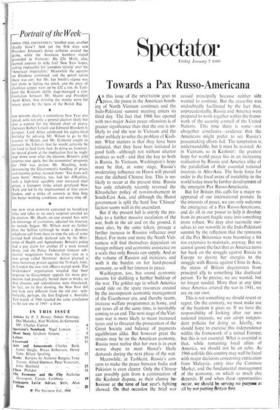Towards a Pax Russo-Americana
A s this issue of the SPECTATOR goes to iipress, the pause in the American bomb- ing of North Vietnam continues and the Indo-Pakistani summit meeting enters its third day. The fact that 1966 has opened with two major Asian peace offensives is of greater significance than that the one is un- likely to end the war in Vietnam and the other unlikely to solve the problem of Kash- mir. What matters is that they have been initiated, that they have been initiated in good faith—although not without ulterior motives as well—and that the key to both is Russia. In Vietnam, Washington's hope must be that, at some stage, Russia's moderating influence on Hanoi will prevail over the diehard Chinese line. This is un- likely to occur at the present time. Russia has only relatively recently reversed the Khrushchev policy of non-involvement in South-East Asia, and although the Hanoi government is split the hard line 'Chinese' faction seems well in the ascendant.
But if the present lull is simply the pre- lude to a further massive escalation of the war, both in the air and on the ground, it must also, by the same token, presage a further increase in Russian influence over Hanoi. For more and more the North Viet- namese will find themselves dependent on foreign military and economic assistance on a scale that only Russia can supply. And as the volume of Russian aid increases, and with it the burden on her hard-pressed economy, so will her interest in peace.
Washington, too, has sound economic reasons for disliking a further build-up of the war. The golden age in which America could ride on the spare resources created by the incompetent economic management of the Eisenhower era, and thereby rearm, increase welfare programmes at home, and cut taxes all at the same time, is inevitably coming to an end. The next stage of the Viet- nam war is more likely to mean increased taxes and to threaten the prosecution of the Great Society and balance of payments equilibrium alike. But however great the strains may be on the American economy, Russia must realise that her own is in even worse shape to meet Hanoi's likely demands during the next phase of the war.
Meanwhile, at Tashkent, Russia's con- cern to make the peace between India and Pakistan is even clearer. Only the Chinese can possibly gain from a continuation of the Kashmir dispute, as their clumsy be- haviour at the time of last year's fighting showed. On that occasion the brief war ceased principally because neither side wanted to continue. But the cease-fire was undoubtedly facilitated by the fact that, unprecedentedly, Russia and America were prepared to work together within the frame- work of the security council of the United Nations. This time there is some—not altogether conclusive—evidence that the Americans might prefer to see Russia's peacemaking efforts fail. The temptation is understandable, but it must be resisted. As in Vietnam, so in Kashmir: the greatest hope for world peace lies in an increasing realisation by Russia and America alike of the parallelism of their essential national interests in Afro-Asia. The basic force for order in the focal areas of instability in the world today must be further development of the emergent Pax Russo-Americana.
But for Britain this calls for a major re- appraisal of our international posture. In the interests of peace, we can only welcome the emergence of a Pax Russo-Americana, and do all in our power to help it develop from its present fragile state into something more robust. We may also reconcile our- selves to our non-role in the Indo-Pakistani summit by the reflection that the remnants of the Pax Britannica were becoming a bit too expensive to maintain, anyway. But we cannot ignore the fact that as America turns her back on the struggle against Russia in Europe to devote her energies to the struggle with Russia against China in Asia, the status of Britain degenerates from principal ally to something like displaced person. To be precise, we are wanted, but no longer needed. More than at any time since America entered the war in 1941, we are on our own.
This is not something we should resent or regret. On the contrary, we must make use of the freedom it gives us. If we have the responsibility of looking after our own national interests, we can adopt indepen- dent policies for doing so. Ideally, we should hope to exercise this independence within the framework of a united Europe; but this is not essential. What is essential is that, while remaining loyal allies of America, we should not be an echo. As 1966 unfolds this country may well be faced with major decisions concerning extrication from Malaysia, entry into the Common Market, and the fundamental management of the economy, on which so much else depends. If and when these opportunities occur, we should be serving no purpose at all by not putting Britain first.






























 Previous page
Previous page